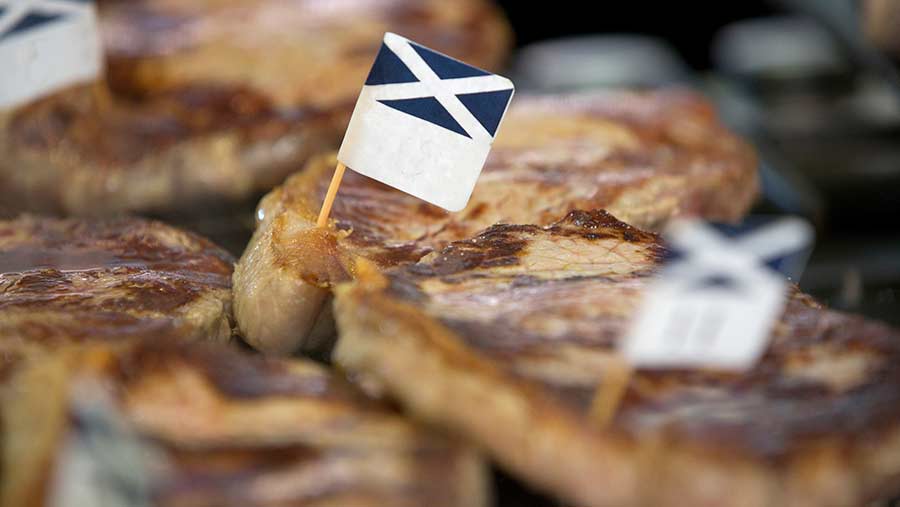Food security moves to heart of Scottish government policy
 © Tim Scrivener
© Tim Scrivener The Scottish government has agreed to establish a dedicated food security taskforce to ensure the food and farming industry can react to any future shocks in the food and farming system in the face of the Ukraine war.
New national food security structures will be established in Scotland, including a new Food Security Unit inside government which, working in collaboration with industry, will monitor risks, identify how to protect food production and supply, and respond rapidly to threats.
The Covid-19 pandemic, the fallout from Brexit and the impact of Russia’s illegal invasion of Ukraine have placed greater strain on both domestic and global food supply chains.
See also: Refocus farm policy on food security says NFU Scotland
Speaking at the Royal Highland Show, in Ingliston, near Edinburgh, Mairi McAllan, MSP, minister for environment and land Reform, committed the Scottish government to new food security structures in Scotland.
The taskforce should offer assurances that Scottish government will be able to act “quickly and nimbly” to any shocks, she told delegates at a QMS breakfast briefing.
“While current supplies are secure, there has never been a bigger strain on short supply chains for many years,” said Ms McAllan.
Union approval
NFU Scotland president Martin Kennedy said “the penny was finally dropping” with both the Scottish government and UK government of the vital need for the UK to secure its own domestic food supply.
“It is really important that governments understand what is happening on the ground,” Mr Kennedy told a press briefing.
“We, as an industry, tend to look far forward into the future – years in the future. We need governments now, and everybody, to be honest, to look at the reality and implications of what would happen if we stopped producing food and agriculture in Scotland.”
Global food security has risen in importance since the Ukraine war started in February, Mr Kennedy said.
“What is probably very important now, given the Ukraine crisis, is that if we don’t produce it here… we will import our product from somewhere else,” he warned.
“We don’t want to be part of that reason for humanitarian hardship in other parts of the world because they can’t afford to produce it or compete.”
Scottish government’s decision to launch a dedicated food security taskforce follows a three-month joint review working with food and drink industry stakeholders.
James Withers, chief executive of Scotland Food and Drink, said: “Food security is going to be the dominant global theme over the next decade.
“The horrors unfolding in Ukraine has brought it into stark focus, but the climate emergency means it is an issue here to stay.”
Food strategy pledge
Last week, the UK government committed in its National Food Strategy to broadly maintain the current levels of domestic food production, which is about 60% of all the food we consume.
Meanwhile, Ms McAllan confirmed that subject to the approval of Scottish parliament, farmers and crofters will receive their Basic Payment Scheme (BPS) and Greening payments in September – about a month earlier than planned.
“We remain committed to delivering over 70% of payments by the end of December and over 95% of payments by the end of February 2023,” she added.
More than £200m to back innovative projects
Projects which aim to boost food security in Scotland and address the biodiversity and climate crises will benefit from a major Scottish government funding programme.
First minister Nicola Sturgeon announced more than £200m through the 2022 to 2027 Environment, Natural Resources and Agriculture Strategic Research Programme (SRP).
The programme will support more than 150 projects over the next five years, including:
- Greenhouse gas reductions for agriculture and livestock
- Crops for vertical farms, which will help to produce a wide range of economically valuable crops
- Vaccine research into animal diseases, including bovine respiratory disease
The fund backs long-term research programmes and science facilities, which directly support Scotland’s academic research base and allows research institutes to leverage additional funding from other funders.
Speaking at a QMS breakfast briefing at the Royal Highland Show, Ms Sturgeon said: “The support confirms our determination, in a tough financial climate, to ensure that Scotland continues to make an important contribution to research on agriculture and the environment, contributing to the success and sustainability of our farming and food sectors.”
